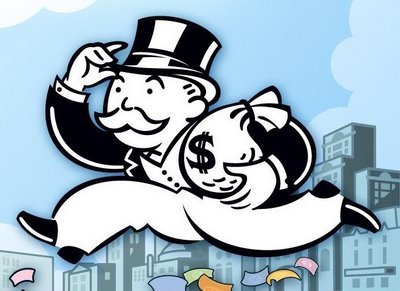Show Me The Money
I love Christmas break. Time off from work, sleeping in past 10 a.m., hanging out with family and most of all playing Monopoly with my 10 year old daughter Grace. Now, don’t assume because Grace is 10 she isn’t a worthy opponent. In fact, the last two games she has beat me fair and square. Since I love the game of Monopoly, I decided about two years ago I needed to disciple my daughter into the finer art of playing the game. I began by explaining the rules, laying out game pieces and counting the money each of us were going to begin with. With all seriousness in my voice, I looked Grace in the eyes and said, “You have to spend money to make money!” She was hooked. I also believe the last game I won was that day at our dining room table.
This past week while reading “The Protestant Ethic and the “Spirit” of Capitalism by Max Weber I was struck by the concept of the three “Essentials” of capitalism. More specifically how these essentials shape our understandings and levy our judgments as to what is valuable or useless for all of society. The following are these three essentials and how they shape our values.
Remember that time is money… For years I have heard the statement, “time is money”. You’re on the clock, get moving. For most in western cultures in a post industrial revolution era, all we know is work. Rest, I’m not sure what that means. To rest, was another way of saying a person is lazy. So subtly the core essential “time is money” became a driving force for how we validate value within our own identities as well as others. Within this essential the natural balance of work and rest were lost, minimizing concepts like sabbath, rest and loving your neighbor when not being paid. In Monopoly terms, pass the dice we need to keep the game moving.
Remember that credit is money… The one who holds the credit makes money, has value and is in control. Does 19% interest sound familiar to anyone? I think the best illustration of this essential is the post Christmas balance of American’s credit cards. In a story released on MSNBC last week, the average American post Christmas credit card balance was $4000 U.S. dollars. At an average of a mere 19%. They concluded, most will pay a total of $8000 until their card’s balance reaches zero. The banker always wins.
Remember that money is of the prolific, generating nature… You have to spend money to make money! If you haven’t figured out how to win at Monopoly yet, here’s the trick. You have to acquire property, build hotels as quick as possible, take all the other people’s money in rent and then allow your money to make money. The third and final essential is money can produce it’s own money. If wise, invested well and certainly in today’s market with a little luck, your money will reproduce itself. Eventuality, others go bankrupt in the game because the one with the most money, holds all the value.
Money, Value, and the “Spirit” of Capitalism.
Wayne Muller in his book “Sabbath” tells a story about the modern day measure of value known as G.D.P. or the Gross Domestic Product. It seems fairly reasonable, a simple way of measuring growth, success and value of a country. However, at a deeper inspection we begin to see that when wealth is measured only by goods and services bought and sold, we subtly begin to associate only those actions involving money as having value. Thus, anything done in time not involving money is seen as useless.
Muller illustrates his point with the following story. “Consider a woman in Somalia who rises early to walk two miles to the nearest well to get water for her family, returns to feed her children and ready them for school, spends the morning working the soil of the family garden, the afternoon tending to the sick and infirm of her village, then in the evening cooks and mends clothing and sings songs to her tired children and makes love with her husband. As measured by the G.D.P., this woman has no value. She is useless; a drain on the nations wealth.
Now let us look at her cousin, who was lucky enough to go to military school and become a soldier. As a government-employed pilot, let us say he is ordered to bomb a mountain enclave deemed sympathetic to some rebel cause. In this case, a great deal of money must be spent to bury all the dead men, women, and children, to rebuild the destroyed buildings, to pay soldiers to police the area, fly in emergency personnel, hire extra doctors, and recruit federal aid – not to mention the money needed for fuel, bombs, and military aircraft. By murdering innocent children, our young pilot has done a very good thing; he has provided an enthusiastic boost to our economy. The woman who draws the water and tends the sick and feeds the children has, according to our official measurement of growth and wealth, provided nothing at all. At the end of the day, it is the pilot, not the mother, who will get the medal for service to the nation.
Everyday on this planet, millions of actions performed with love are dismissed, while actions performed with money are honored and rewarded.

I am sure Grace and I will play Monopoly again, but as we play there will be a new understanding as a father conveying healthy value and worth to a daughter who needs to see the value in all, and not just what she can consume or capitalize from others.
Leave a Reply
You must be logged in to post a comment.